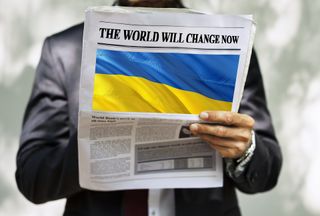Students learning about the Ukraine conflict today have no shortage of information. However, as with many other topics from COVID-19 to the 2020 election, finding reliable and accurate information isn’t always easy.
One way to help students learn to recognize propaganda is to have them read it, says Kevin Buterbaugh, chair of the Political Science Department at Southern Connecticut State University
“I would encourage instructors to actually have their students examine the English language versions of Ukrainian and Russian media, so they can see the propaganda war that's taking place, especially on the Russian side,” Buterbaugh says.
Buterbaugh shares some of the sources, both reliable and unreliable, he has been exploring with his students. We’ve also included several resources that we’ve come across that can help both educators and students explore the background to the conflict.
In addition, see our recent piece: Teaching The Russia – Ukraine Conflict.
1. Russia Today
This state-sponsored Russian publication is not the most reliable source on the conflict in Ukraine but it can still be educational. “It’s a real propaganda organ of Russia, but it’s actually worthwhile to look at because you can see how they're trying to mold the narrative,” Buterbaugh says. This happens more subtly than students might expect. “A lot of their stories look really like good journalism. In fact, they have some real journalistic pieces there, but folded in amongst them is clearly propaganda for the Russian side,” he says.
2. Kyiv Post
Reading this Ukrainian newspaper can give students insight into the way the war is being covered by Ukrainian media, Buterbaugh says. The differences between the coverage here and in Russia Today should be easy to spot, however, students might also see how it differs from Western coverage of the conflict.
3. Council on Foreign Relations
This U.S.-based nonpartisan member organization, think tank, and publisher, can be an excellent resource for news and analysis about the ongoing conflict in Ukraine, Buterbaugh says.
Buterbaugh recommends the War on the Rocks’ “Horns of a Dilemma” podcast, which is hosted by the Texas National Security Review and features leaders and thinkers based at the University of Texas. Unlike the frequently shouting talking heads on news TV, on this podcast, “You get academics debating with each other,” Buterbaugh says. However, the podcast is aimed at a general audience, so the debates – though deep and high-level – don’t include a lot of academic jargon that would be above students’ understanding.
5. The Real and Imagined History of Ukraine
One of the pretenses Russian president Vladimir Putin used prior to the start of the invasion was that Ukraine was essentially a made-up country. Yale historian Timothy Snyder explains why that is not true in this 28-minute episode of Vox’s Today, Explained podcast. Snyder also gives a quick and informative overview of Ukraine's history and its complicated and frequently tragic entanglements with Russia.
6. Fact-Checking Sites for Students
While teaching students how to critically examine sources, educators may want to share the fact-checking resources featured here. Included is a wide range of sites that can help students separate fact from fiction and debunk myths.
7. The Other Mr. President from This American Life
This episode of This American Life uses previously aired segments as well as new reporting to provide a terrifying picture of Putin’s regime. From examining evidence that Putin, or others in the Russian government, may have risen to power by orchestrating a series of terrorist attacks on their own people to a profile of a Putin loyalist who helped design his propaganda strategy, the podcast provides a great deal of insight and perspective.


